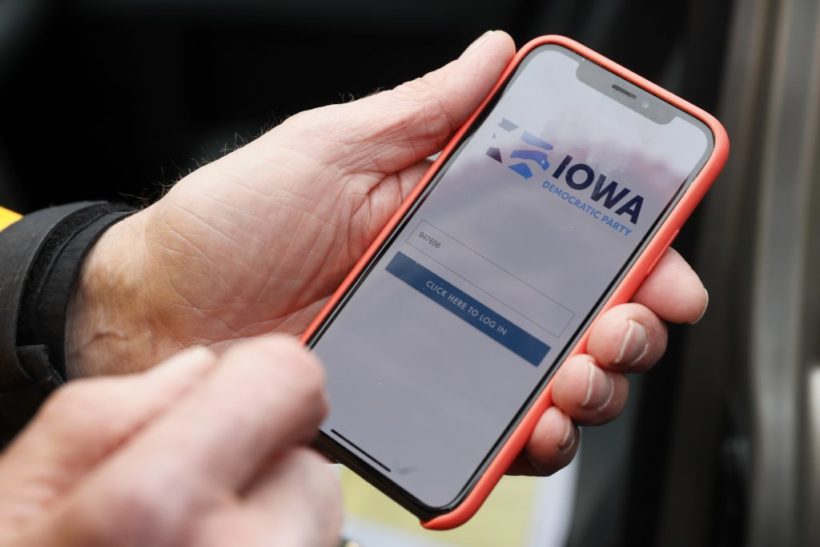
Precinct captain Carl Voss, of Des Moines, Iowa, holds his iPhone that shows the Iowa Democratic Party’s caucus reporting app Tuesday, Feb. 4, 2020, in Des Moines, Iowa. (AP Photo/Charlie Neibergall)
redo Jump to...
print Print...
(by Emily Jacobs, New York Post) — The Nevada Democratic Party said Tuesday it will no longer use the app that is being blamed for the stalled results in Iowa’s Democratic caucuses Monday night.
“NV Dems can confidently say that what happened in the Iowa caucus last night will not happen in Nevada on February 22nd. We will not be employing the same app or vendor used in the Iowa caucus,” state party chair William McCurdy II said in a statement Tuesday.
“We had already developed a series of backups and redundant reporting systems, and are currently evaluating the best path forward.”
The announcement comes as results of the Iowa caucuses remain under wraps Tuesday afternoon, after problems with an app created by Shadow Inc. that was supposed to simplify and streamline the process of reporting caucus results.
The Nevada Democrats paid Shadow Inc. $58,000 in August 2019 to develop an app for their late February caucus, according to Federal Election Commission records.
The Iowa Democratic Party (IDP) paid the company over $63,000 in two payments in November and December 2019, records show.
Iowa Democratic officials have blamed the delay in the release of Monday night’s results on the app, with party chair Troy Price saying it was only reporting partial data due to a “coding issue.”
Precinct chairs across the state experienced problems downloading or logging into the app, one of the ways they were supposed to be able to send the results from their smaller, individual caucuses to the IDP.
The party’s backup was also not up to par, Dr. Karen Kedrowski, director of the Catt Center for Women and Politics at Iowa State University and an expert on caucus history, told The Post.
Kedrowski said that for decades, precinct chairs used a phone to call in caucus results to the IDP as the main method of submitting the data.
But when the app didn’t work Monday night, the IDP’s phones started ringing off the hook with calls from nearly all of the state’s 1,700 precincts trying to report their vote counts.
The IDP also did not provide enough phone lines at precinct locations to call in with.
The Iowa party said Tuesday it would release a “majority of the results” from Monday’s caucus at 5 p.m. EST Tuesday.
Published at NYPost .com on Feb. 4, 2020 (at 3:48 p.m.). Reprinted here for educational purposes only. May not be reproduced on other websites without permission from the New York Post.
Questions
1. a) When is Nevada’s Democratic primary?
b) What will the Nevada party use in place of the app they bought from the same company (Shadow Inc.) the Iowa Democrats used?
2. a) How much did each state party pay for the app?
b) What was the app supposed to do?
3. What problem did the Iowa Democratic Party experience with the app used for reporting caucus results? – Why did the backup reporting fail?
4. How had Democratic precinct chairs in Iowa report the results of their caucus for many years prior?
5. Acting Department of Homeland Security Secretary Chad Wolf said in an interview this week that the Department of Homeland Security offered to test the app used in the Iowa Democratic caucuses, but officials declined the offer.
What do you think about the party’s use of this app?
Background
From a ZeroHedge report:
The Iowa Democratic Party didn’t immediately respond to a request for comment about how the party tested the app. Party officials declined to provide details about the app when asked by multiple outlets before the election. Troy Price, the chairman of the state party, told NPR that the state party worked with the national party’s cybersecurity team and Harvard University’s Defending Digital Democracy project.
Party spokeswoman Mandy McClure said late Monday that the election results were delayed due to “quality checks” and inconsistent reporting, but said the app developed by Shadow did not go down and was not hacked. Ballots provided a sound paper trail that was being used to tally the results, she added.
No email addresses or phone numbers were listed on Shadow’s website. The company is full of “campaign and technology veterans” who have built and put into place technology for Hillary Clinton’s and Barack Obama’s campaigns as well as Google, the Democratic National Committee, and the AFL-CIO union, the company said.
Daily “Answers” emails are provided for Daily News Articles, Tuesday’s World Events and Friday’s News Quiz.



